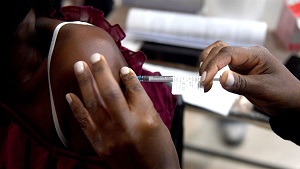The findings on Vaccine Inequality and Hesitancy and Barriers to Covid-19 Vaccination demonstrate that vaccine hesitancy has declined slightly from 28% recorded in Round 4 of the survey undertaken between June 25 and July 20, 2021 to 25% in Round 5. This illustrates that the proportion of the adult population that is vaccine hesitant is largely stable.
While overall the level of vaccine hesitancy is stable there have been some important positive shifts in vaccine hesitancy. The level of vaccine hesitancy among those aged 18-24 years has declined by 16 percentage points and by 9 percentage points among 25-34 year olds. It has, however, remained stable in older age groups.
Vaccine hesitancy among White adults, who in previous rounds of the survey were the most vaccine hesitant group, has declined by 18 percentage points although the levels of hesitancy within this group remain higher than among Black African or Indian and Asian adults.
Generational differences, knowledge about vaccines and political trust play an important role in informing vaccine hesitancy.
Speaking to Channel Africa, Professor Carin Runciman, Director at the Centre for Social Change at speaking UJ said: “the report demonstrates important inequalities in vaccination coverage that cannot be explained by corresponding levels of vaccine hesitancy”.
“Indeed, variations in vaccination appear to mirror wider socio-economic inequalities”, Runciman added.
At the time of the survey 38% of adults indicated that they were willing to take a Covid-19 vaccine but had not yet done so. 23% of unvaccinated but vaccine favourable adults stated that they did not know where to go for vaccination, 17% reported it was difficult to get to a vaccination site, 17% faced cost-related barriers in travelling to vaccination sites, while 16% referred to time constraints.
Runciman elaborates further on the research findings.
Click link below to hear more…
--Amanda Matshaka/Channel Africa--













